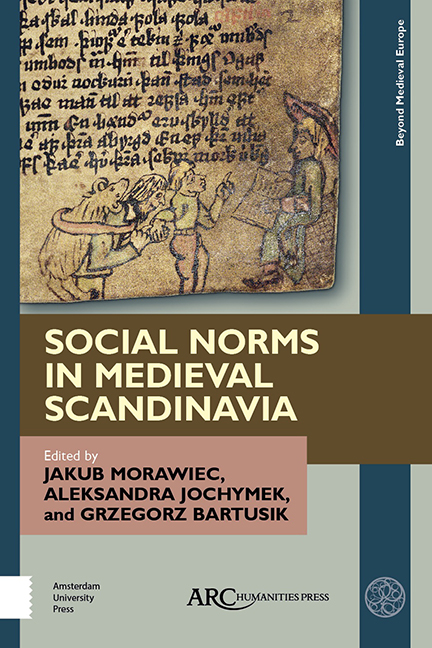Preface
Published online by Cambridge University Press: 20 November 2020
Summary
THE RICHNESS AND diversity of the preserved literary tradition, together with the spiritual and material culture of medieval Scandinavia, have encouraged scholars of various fields to engage in searching analytical enquiry into the histories of past societies of the North. At the same time its disparities and fragmentation leave many aspects without final answers. This is especially relevant in the case of normative behaviour and reasoning which are mainly preserved orally, performatively, or ritually, and rarely in a written or material shape, making their transmission dependent on ongoing cultivation. Since no state in the North now follows the laws of past societies, they would have been inaccessible to us if it were not for new research methods that allow us to get a glimpse of these lost worlds preserved fragmentarily on archaeological sites and in literature.
For centuries studies undertaken in the field of Old Norse– Icelandic culture have embraced many issues: developments in material culture, religious change, processes of power consolidation, to name only a few. While individual and singular historical events and figures have perhaps for too long been the main subject of historical inquiries, the immense corpora of preserved texts and objects can reveal the regularities and recurrences of everyday life of both social elites and ordinary people, embodied in a set of implicit norms that determined behaviour and common understandings of social coexistence.
History is built on the great battles and wars, but the past consists in large part of the everyday struggles of ordinary, very often anonymous, people. Values cultivated by them such as honour, prestige, loyalty, fidelity, manhood, authority, and duty, were even more important than prescriptive norms superimposed by wishful thinking elites and rulers, because their meaning, practice, and evaluation exceeded legal provisions and law codes, expressed instead in rituals, habits, customs, religion, literature, language, and social cognition, revealing those norms that were actually internalized and performed by the society. These implicit rules and laws ultimately motivated human actions and were crucial as much for the pursuit of personal ambitions and goals as for everyday survival. There are numerous instances in which Scandinavian literature of the Middle Ages can be used to reveal the core meaning of these ideas. It is a rich source of representations of characters both maintaining and obeying the norms, as well as transgressing and breaking them.
- Type
- Chapter
- Information
- Social Norms in Medieval Scandinavia , pp. ix - xivPublisher: Amsterdam University PressPrint publication year: 2019



